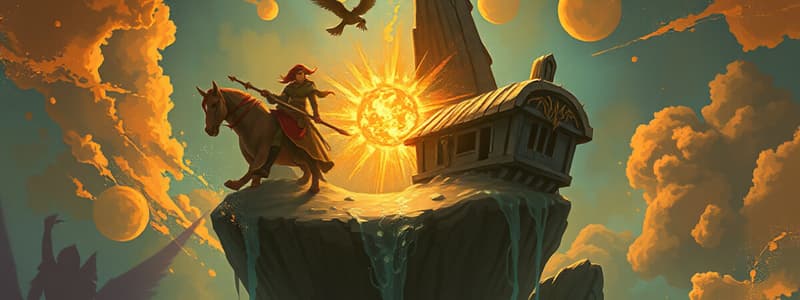Podcast
Questions and Answers
What is the primary difference between creativity and imagination?
What is the primary difference between creativity and imagination?
- Creativity is based on fantasy, while imagination is based on reality.
- Creativity involves seeing the impossible, while imagination is about existing ideas.
- Creativity requires knowledge and exploration, while imagination does not.
- Creativity is focused on possible ideas, whereas imagination can involve impossible concepts. (correct)
Which characteristic is NOT associated with a creative personality?
Which characteristic is NOT associated with a creative personality?
- Creative individuals often possess great energy.
- Creative individuals can be humble and proud simultaneously.
- Creative individuals are consistently extroverted. (correct)
- Creative individuals may be quiet at times.
How does creativity allow individuals to engage with ideas?
How does creativity allow individuals to engage with ideas?
- Creativity enables the idealization of impossible scenarios.
- Creativity allows individuals to ignore the context of their ideas.
- Creativity requires individuals to have knowledge and motivation. (correct)
- Creativity focuses solely on practical applications of ideas.
Which statement about creative individuals is accurate?
Which statement about creative individuals is accurate?
What enables creativity to transform existing ideas into new ones?
What enables creativity to transform existing ideas into new ones?
In what way does imagination differ from creativity according to the content provided?
In what way does imagination differ from creativity according to the content provided?
How are culturally significant creative individuals characterized?
How are culturally significant creative individuals characterized?
What type of energy do creative individuals typically possess?
What type of energy do creative individuals typically possess?
What does art primarily symbolize according to its definition?
What does art primarily symbolize according to its definition?
How do Gustlin and Gustlin define art appreciation?
How do Gustlin and Gustlin define art appreciation?
Which of the following is a key aspect of creativity?
Which of the following is a key aspect of creativity?
What motivates individuals to be creative according to the content?
What motivates individuals to be creative according to the content?
Imagination is best described as the ability to:
Imagination is best described as the ability to:
What are the universal and timeless qualities that art appreciation seeks to understand?
What are the universal and timeless qualities that art appreciation seeks to understand?
Art can convey which of the following?
Art can convey which of the following?
Which of the following best describes the relationship between creativity and problem-solving?
Which of the following best describes the relationship between creativity and problem-solving?
Flashcards are hidden until you start studying
Study Notes
Objectives of the Lesson
- Define art appreciation and its relevance to human experience.
- Explain the roles of creativity and imagination in art creation.
- Encourage students to form their own definition and perspective on art.
Definition and Etymology of Art
- Derived from Latin word “ars,” meaning art, skill, or craft.
- First known usage dates to 13th-century manuscripts; likely existed since the founding of Rome.
- Art symbolizes human existence, expressed physically for interpretation.
- Art conveys thoughts, emotions, and concepts, reflecting the full spectrum of human experience.
Definition of Art Appreciation
- Art appreciation involves understanding art in its historical and cultural contexts.
- Focuses on the development of art through specific periods.
- Involves analysis of art's universal qualities, enhancing enjoyment through composition and design principles.
Concept of Creativity
- Creativity is the ability to generate useful ideas and alternatives for problem-solving and communication.
- Motivations for creativity include:
- Desire for novel and complex stimulation.
- Need to express ideas and values.
- Drive to solve problems.
Differences Between Creativity and Imagination
- Creativity involves meaningful actions based on existing ideas; imagination focuses on envisioning the nonexistent.
- Creativity allows the creation of valuable new concepts; imagination explores impossible possibilities.
- Creativity requires knowledge, motivation, and energy; imagination requires context for envisioning ideas.
Common Uses of Creativity
- Individuals with unusual thoughts, perceived as bright and stimulating.
- Those experiencing the world in novel and original ways leading to important discoveries.
- People who create significant cultural changes through their public achievements.
Characteristics of a Creative Personality
- High energy but can also exhibit quietness and restfulness.
- Remarkable combination of humility and pride.
Studying That Suits You
Use AI to generate personalized quizzes and flashcards to suit your learning preferences.




